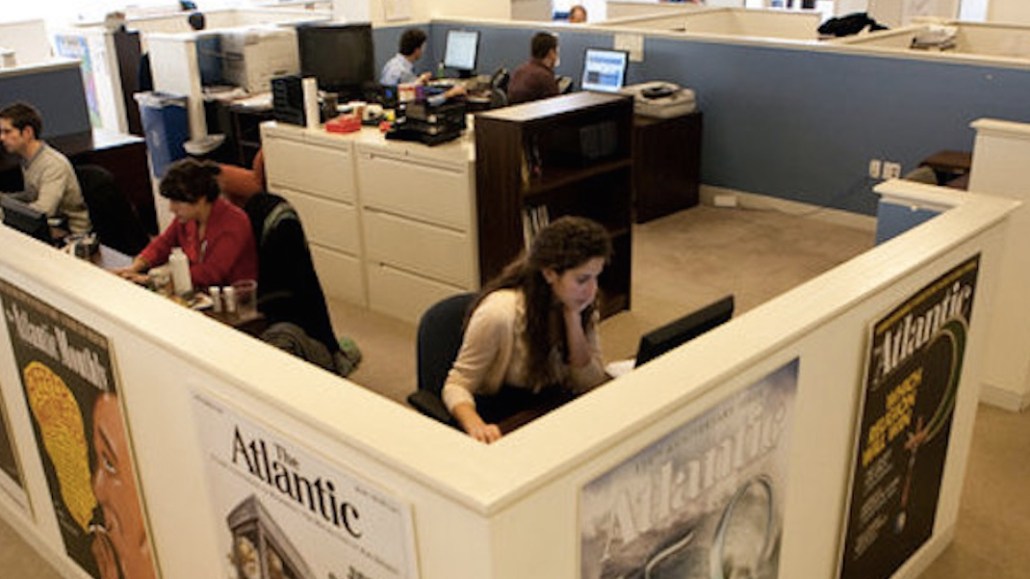Secure your place at the Digiday Media Buying Summit in Nashville, March 2-4

The Atlantic announced this week that it’s officially planting the flag in U.K. soil and opening its first international bureau in London this summer. A team of 10 — split between editorial and commercial — will work to grow non-U.S. readers and advertising partners.
For a 160-year-old media company, this may seem overdue. “I wish we could have done it earlier,” said Atlantic president Bob Cohn. “For me the penny really dropped when I saw a stat last year that said 28 percent of our readership is from outside the U.S.” The Atlantic claims nearly 34 million monthly uniques, 10 million of which are outside the States; around 4 percent of its audience comes from the U.K. “There’s been a gradual realization that in order to keep growing the brand and readers, we have to go beyond U.S. borders.”
The Europe team will be led by Atlantic veteran Jim Fallows, with one or two reporters in Paris, for now producing text articles for print and online. The same content will be available in the U.S. too, but the U.K. homepage will highlight more local stories. While Cohn said there’s no particular European story that played into its impulse to expand, it will cover areas like Brexit and elections across the continent, as it already does, but in greater depth with more reporters on the ground. Lucy Kirkland, The Atlantic’s executive director for EMEA, will head up the commercial side in London and continue growing the publisher’s branded-content partnerships. It will operate separately from sister publication, Quartz, which has its own U.K. footprint.
Until now, international stories have been covered by global freelancers. In the last 18 months, cover stories with international angles — Obama’s foreign policy, the movement of Jews in Europe, a piece on the strategy of Islamic State — have performed particularly well, the latter breaking records for dwell time stats over the year, according to analytics company Chartbeat.
Currently, all content from The Atlantic is free to read online. It sells an annual subscription to the print magazine for $39.50 (£31.82), which also gives readers access to The Atlantic app and digital edition. With this international expansion, it will start selling a digital-only subscription, a replica of the magazine, for $24.99 (£20.13) to offer an alternative for overseas readers to be members.
The Atlantic is also beefing up its membership program to encourage more reader interaction, such as offering newsletters from editors, audio files or excerpts from e-books. For the March edition, readers could join a conference call with senior editor David Frum; 3,500 joined the conference call, which drove 700 new subscribers. According to the publisher, it has a print circulation of 500,000, with about 70,000 coming from newsstands.
In the Trump era, there is a global appetite for U.S. opinion, said Dan Chapman, head of digital at Mediacom, whether that’s looking to the U.S. financial markets, which have significance on the global economy, or Donald Trump.
“The U.S. point of view has always been easy to seek out,” said Chapman. “But by not focusing on curated content delivered by an algorithm, there’s an argument that culturally the time is right for people and it’s a good opportunity.”
There is also a good opportunity to create more branded content too, which The Atlantic claims currently makes up 60 percent of revenue. “The margin is high with branded content,” points out Chapman.
On the events side, Cohn predicts the publisher will produce a couple high-production-value conference events a year in the U.K., plus more regular, possibly monthly, smaller events with Fallows in conversation with politicians or business leaders. As it is, in the U.S., it has 45 people working in its events division, Atlantic Live, which started 10 years ago, and now accounts for 16 percent of overall revenue.
The challenge now, of course, is in bringing in more local readers and advertisers. “We have some experience in that,” said Cohn. “We’re starting with the obvious: nearly a third of audience overseas. That’s a head start. Now we need to bring coverage of U.S. to Europe, create new coverage of the world and then bring that coverage back to the U.S. The coverage in London and elsewhere will be important.”
Image: Courtesy of The Atlantic.
More in Media

From feeds to streets: How mega influencer Haley Baylee is diversifying beyond platform algorithms
Kalil is partnering with LinkNYC to take her social media content into the real world and the streets of NYC.

‘A brand trip’: How the creator economy showed up at this year’s Super Bowl
Super Bowl 2026 had more on-the-ground brand activations and creator participation than ever, showcasing how it’s become a massive IRL moment for the creator economy.

Media Briefing: Turning scraped content into paid assets — Amazon and Microsoft build AI marketplaces
Amazon plans an AI content marketplace to join Microsoft’s efforts and pay publishers — but it relies on AI com stop scraping for free.








